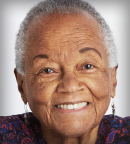
Beverly Canin
Nothing about us without us is a centuries-old value that is a cornerstone of meaningful patient engagement in clinical research. Such engagement has not been automatic and is still largely absent in geriatric oncology research, where older patients traditionally have been excluded from clinical trials, and consideration has not been given to the inclusion of similar patients as partners in the research. There’s been progress in the past couple of decades, but there is still a long way to go to realize the full potential of patient engagement in clinical research: to make it standard research practice.
Patients and related stakeholders can be engaged meaningfully in many different ways. They include the origin, adaptability, sustainability, and challenges of one successful model of patient engagement: Stakeholders for Care in Oncology and Research for Our Elders, also known as SCOREboard. It has worked well in the United States. Admittedly, it may not be feasible in countries with fewer resources, but it may help to shape some goals for the future.
The Road to Patient Advocate and Research Partner
First, a very little bit about me. My evolution from patient to patient advocate to partner in research began when I was diagnosed with breast cancer in 2000 and discovered that I was not made aware of all my options for treatment. That led, among other things, to attending the annual National Breast Cancer Coalition (NBCC) Advocacy Leadership Summit and Lobby Days and the NBCC Project LEAD course, to learn the basic science of breast cancer and to have a more informed seat at the cancer health-care table.
My road to patient advocate as research partner began at the 2011 ASCO Annual Meeting. I was blown away by a session on prediction, prevention, and treatment of chemotherapy toxicity in older patients and soon joined the Cancer and Aging Research Group (CARG). By participating, I learned that CARG is an internationally respected volunteer organization with a mission to join geriatric oncology researchers across the nation in collaborative research efforts to improve the care of older adults with cancer. One of the CARG co-leaders, Dr. Supriya Mohile, invited me to collaborate with her in developing a stakeholder advisory group for a study she was designing for a grant application to the Patient-Centered Outcomes Research Institute.
“Nothing about us without us is a centuries-old value that is a cornerstone of meaningful patient engagement in clinical research.”— BEVERLY CANIN
Tweet this quote
It was called Communicating About Aging and Cancer Health, or COACH. It compared the effectiveness of providing a patient-reported geriatric assessment summary to patients, caregivers, and oncologists vs usual care in improving patient satisfaction with communication about age-related concerns during advanced cancer treatment. That advisory group was the original SCOREboard and included a membership similar to the participants in the study: current or former patients older than age 65 when treated for cancer, current or former caregivers of such patients, and cancer patient advocates with an interest in cancer and aging research.
The mission was (and is) to improve aging and cancer research and care delivery by infusing the knowledge and experience of older patients with cancer and their caregivers in all aspects of the research process. We recognized the value of having a group rather than only one or two individual consultants and learned the importance of early engagement of a leader, who can be a voice for patients and for recruitment of peers to the group. It was necessary to define roles clearly and to have administrative support for managing all the organizational details a group requires. A recruitment process had to be developed. It included the who and what of outreach as well as the preparation of materials. Meetings would be held virtually, long before such meetings were imposed on all of us.
There were 14 members. We sought to have diversity in age older than 65; cancer types and history; geographic location; gender, race, and ethnicity. We engaged at every stage of the study from concept to dissemination. We evaluated with the research team the efficacy of materials, such as consent forms, recruitment fliers, questionnaires, and more. We role-played to help research assistants feel more comfortable administering questionnaires over the phone, and we provided input on the selection of domains that could offer useful data for future substudies.
A CARG Project Is Born
Just as the COACH study was concluding, and we were concerned about how we could sustain a successful collaboration with researchers, CARG was considering a project to develop a national infrastructure for cancer and aging research (CARinG). Many original SCOREboard members engaged, and others were recruited; CARG received a National Institutes of Health (NIH) Phased Innovation Award, which provides up to 2 years of NIH on Aging R21 support for initial developmental activities and up to 3 years of NIH R33 support for expanded activities. This CARinG project has been renewed and is an ongoing study.
Among the specific aims of this CARinG project is to solidify the infrastructure and expertise by means of six cores: analytics, clinical implementation, communication, health services, measures, and supportive care. The who and what of the emergent CARinG SCOREboard are identical to those of the original SCOREboard. The difference is in the how. In the CARinG project, instead of being focused as a group on a single study, we bring a patient-centered approach to the research in the following ways: we have two members serve on each core, we provide feedback on current or proposed research by CARG investigators at monthly meetings, and we present at conferences and coauthor manuscripts with investigators.
Continuing sustainability and adaptability of the model, patient engagement has been deeply infused in The Rising Tide Foundation’s Clinical Cancer Research Program Geriatric Oncology Treatment Optimization (GOTO) for Patient-Centered Research Award to CARG. This project leverages the CARG infrastructure to implement five clinical trials in different cancers across multiple institutions in the United States and one in Brazil. Each of the clinical trials includes CARG geriatric assessment measures, multidisciplinary team interventions, and partnerships with patient partners from a newly formed GOTO SCOREboard; there are also specific charges relevant to geriatric oncology treatment optimization, to ensure each clinical trial addresses the needs and desired outcomes that are most important to patients.
Two GOTO SCOREboard members serve on each of the five studies. By partnering individually with each study, the type of engagement is similar to the original SCOREboard; members are engaged at every stage of their particular study, and only quarterly meetings of the group are held to strengthen communication among all members and individual study teams.
Take-Home Messages
- The guiding principles of partnership—such as reciprocal relationships, co-learning, and transparency—inform all SCOREboard participation in research teams. Diversity, equity, and inclusion are priorities in recruitment.
- There is strength in numbers that allow broad representation similar to study participants.
- Efficient support staff is essential.
- Funders need to be persuaded about the connection of patient engagement to meaningful outcomes and provide sufficient funding for models such as SCOREboard.
DISCLOSURE: Ms. Canin reported no conflicts of interest.
Ms. Canin is a Patient Advocate/Research Partner at the Cancer and Aging Research Group (CARG).
Meet Beverly Canin: From Cancer Survivor to Patient Advocate to Research Partner
by STUART M. LICHTMAN, MD, FASCO
Guest Editor, Geriatrics for the Oncologist, The ASCO Post
Beverly Canin is a nationally respected patient advocate whose work has significantly contributed to the advancement of geriatric oncology and breast cancer advocacy. A breast cancer survivor diagnosed in 2000, Ms. Canin brings more than 20 years of experience as a patient advocate.
Ms. Canin is a long-standing member of the Cancer and Aging Research Group (CARG), where she has served since 2011. She co-founded and chaired Stakeholders for Care in Oncology Research for Our Elders, also known as SCOREboard, a patient and caregiver advisory board launched in 2013 through a Patient-Centered Outcomes Research Institute–funded initiative. Under a CARG renewal of a 5-year grant from the National Cancer Institute and the National Institute on Aging, she co-chairs the CARinG SCOREboard Patient Advocate Board. Also, under a Rising Tide Foundation award, she co-chairs the GOTO SCOREboard Patient Advocate Board. They are both adaptations that support the engagement of older adults with cancer, their caregivers, and patient advocates in geriatric oncology research.

Stuart M. Lichtman, MD, FASCO
In addition, Ms. Canin is former President of Breast Cancer Options, a grassroots support and advocacy organization in New York’s Hudson Valley. She also is a former member of the Board of Directors of Breast Cancer Action, a national organization committed to addressing the root causes of the breast cancer epidemic.
With expertise in advocacy, cancer prevention, health disparities, survivorship, communication, and quality of life, Ms. Canin is a well-respected voice for patients, who has helped the integration of patient perspectives in cancer care and research.
Happy Anniversary SIOG
This article is based on Ms. Canin’s presentation at the 2024 Annual Meeting of the International Society of Geriatric Oncology (SIOG) in Montreal. The 2024 conference theme was “Promoting Equity & Enhancing Optimal Care Delivery.” The 25th anniversary of SIOG will be celebrated this year, with the Annual Conference to be held in Ghent, Belgium, from November 20 to 22, 2025. This conference presents a valuable opportunity for health-care professionals to assess the current landscape of geriatric oncology and foster new collaborative endeavors. The theme of this year’s conference is “Bridging Research and Clinical Practice in Geriatric Oncology.”

